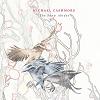 Last year's Sleep England, Michael Cashmore's first solo album under his own name, eschewed the verdant soundworlds of Cashmore's previous work as Nature and Organisation in favor of austere, minimal simplicity. This new EP is somewhat of a return to form, featuring lush arrangements and guest vocals by Antony, singing lyrics written by David Tibet.
Last year's Sleep England, Michael Cashmore's first solo album under his own name, eschewed the verdant soundworlds of Cashmore's previous work as Nature and Organisation in favor of austere, minimal simplicity. This new EP is somewhat of a return to form, featuring lush arrangements and guest vocals by Antony, singing lyrics written by David Tibet.
Sleep England sounded a like Michael Cashmore's version of one of those Wyndham Hill solo guitar records, a style seemingly at odds with his more familiar work in Current 93. Though his compositions for guitar and bass were still shot through with that trademark sense of melancholy beauty, and still consciously drew from the nostalgic wellspring of 1960s British psych-folk, as well as medieval and baroque composition, it was hard not to miss the lush arrangements and guest vocal turns that made Cashmore's 1990s albums as Nature and Organisation so memorable. I can remember first hearing the N&O albums after years of enjoying records by Current 93 and Death in June, and thinking that Cashmore, whether he intended to or not, had assembled the world's first (and only) Apocalyptic Folk "supergroup," tying everything together with his impressive ability to write and arrange such ravishing, evocative music. Though Sleep England was an admirable effort that I quite enjoyed, I secretly held out the hope that Cashmore would return to the style that had informed such classic works as Beauty Reaps the Blood of Solitude and A Dozen Summers Against the World. And with this EP, my wish comes true.
The Snow Abides forms an abbreviated narrative of sorts, opening with the instrumental "My Eyes Open," which serves as a gentle overture for the songs featuring Antony on vocals. The first track begins with a fragile piano figure, recalling Cashmore's unadorned piano compositions for Current 93's Soft Black Stars. Any fears that this EP might share that album's instrumental minimalism quickly fade, however, as a gorgeous swell of strings joins the piano's melancholic refrain. It is a relatively small arrangement, a scaled-back chamber orchestra of sorts, but it sounds resplendent in comparison to the spartan quality of Sleep England.
The title track follows, with Antony's vocals over Cashmore's impressionistic piano melodies. David Tibet's text is perhaps a bit too dense for Antony's vocal talents, which are often better served with simpler phrases and greater structure, but Antony still does an admirable job with an elaborate and meandering lyric. Antony sings: "Royal black and blue/I am not lost (yet little stars)/In the doorway I catch a sign (shuddering still)/No, there is too much, there is too much," the parenthetical phrases representing moments when the vocal is attenuated and moved to the background, or to one side of the stereo channels. At other times, Antony's voice is multitracked for emphasis. This creates an interesting sense of spatial depth on the EP, though I can't help but feel that the vocals are much too prominent in the mix, often drowning out the music.
Such minor quibbles aside, the songs here are somber elegiac, and thus hard to "enjoy" in a traditional sense. However, a sense of beauty and poetry pervades the EP. It is hard not be touched by "How God Moved at Twilight," an evocation of the simple Christian piety and longing of childhood, which threatens to be eclipsed by intervening years of wandering and disillusionment. Cashmore's arrangements on this track are particularly strong, alternating moments of bare piano melody with bursts of lush symphonic catharsis, including flutes and clarinets. "Your Eyes Close" answers the first track with Antony's final vocal on a particularly emotional lyric by Tibet, using images of sleep and wakefulness as symbols for vivification and mortification: "You close your eyes and I die/Whilst others in sleep follow lambs/I look at my hands and count the sun making another scar across my sky."
The EP's final track, "Snow No Longer," musically figures an emotional thaw, with piano tones left to resonate and echo, emphasizing the distance and loneliness of mankind's estrangement from divinity. Finally, in a brief footnote recalling the most spine-chilling moments of classic Apocalyptic Folk, the song fades out in an atmospheric tangle of decaying sound, punctuating by the pristine chime of a single bell. It is a perfect way to conclude an all-too-brief EP that nonetheless manages to communicate a profound spiritual longing through Cashmore's disarming, plaintive melodies.
samples:
Read More

